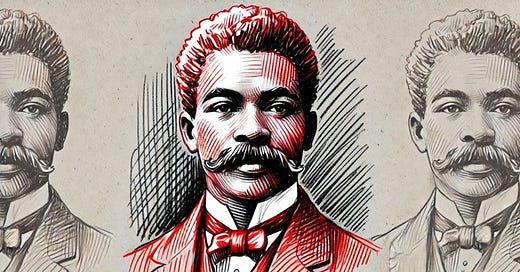I first encountered the name William Alexander Leidesdorff Jr. while living in Folsom, California, a town deeply intertwined with his legacy. Walking through the historic district, I noticed a street named after him and was struck by the significance of this seemingly modest marker.
Intrigued, I discovered that Leidesdorff had once owned a vast estate in the region, known as Rancho Rio de los Americanos, encompassing much of what is now Folsom.
However, it wasn’t until recently, while reading “African American Firsts: Famous, Little Known, and Unsung Triumphs of Blacks In America” by Joan Potter, that I fully grasped the scope of his influence and achievements.
This book shed light on how Leidesdorff, a man of African, Danish, Cuban, and Jewish heritage, defied the racial and social norms of his time to become one of the most prominent figures in early California history.
His story, long overshadowed by others, revealed a powerful example of resilience, ambition, and pioneering spirit that has since inspired me to delve deeper into his extraordinary life.
Leidesdorff Jr. was born in 1810 on the Caribbean island of St. Croix to a Danish sugar planter father and a mother of African and Spanish descent. His mixed heritage placed him at the intersection of multiple identities, an experience that would shape his life and career in significant ways.
Educated in maritime trade, he ventured to New Orleans, where he amassed considerable wealth through his shipping ventures. By the time he arrived in the small village of Yerba Buena—later known as San Francisco—in 1841, Leidesdorff was already a man of means and ambition.
From the moment he set foot on California soil, his impact was immediate and far-reaching. He purchased land, built a home, and opened a store, laying the groundwork for a successful business empire.
His ventures were as diverse as they were pioneering; he launched the first steamboat on San Francisco Bay, established the city’s first public school, and even organized the first official horse race.
But it was his acquisition of a 35,000-acre ranch near Sutter’s Mill—later part of Folsom—that secured his legacy as a visionary entrepreneur. Leidesdorff’s influence in shaping the region’s economic landscape was unparalleled, yet his name remains a mere footnote in most historical narratives.
Discovering Leidesdorff’s Legacy in Folsom
My personal connection to Leidesdorff’s story began while exploring the rich history of Folsom, where I was living at the time. It was during a casual stroll through the town’s historic district that I first noticed Leidesdorff Street, a subtle yet enduring testament to the man whose vast landholdings once encompassed much of the area.
This street, like a breadcrumb from the past, was highlighted in Joan Potter’s book, where I found a brief yet illuminating account of Leidesdorff’s life. Inspired by this serendipitous discovery, I embarked on a quest to learn more about this remarkable figure who, despite his monumental achievements, remained largely unknown.
Leidesdorff’s story is one of resilience, ingenuity, and navigating complex social and political landscapes. Despite being of African and Danish descent in a time of rigid racial boundaries, he transcended these limitations through sheer determination and adaptability.
He became a Mexican citizen, converted to Catholicism, and mastered Spanish, all strategic moves that allowed him to thrive in California under Mexican rule. His ability to forge alliances and navigate different cultural terrains was as much a part of his success as his entrepreneurial ventures.
The First Black Millionaire and Diplomat
Leidesdorff’s influence extended beyond his business endeavors. He served as the U.S. Vice Consul to Mexico at the Port of San Francisco, a position that made him the first Black diplomat in history, predating even Frederick Douglass’s diplomatic role.
His multilingual skills and diplomatic acumen allowed him to mediate between diverse communities and navigate the complex political landscape of a rapidly changing California.
Tragically, Leidesdorff’s life was cut short at the age of thirty-eight by what was then termed “brain fever,” a vague diagnosis that likely masked a more specific ailment. His death came just before the Gold Rush, a twist of fate that denied him the chance to capitalize on the enormous wealth his lands would soon yield.
The battle over his estate, which ensued after his passing, speaks volumes about the precarious position of a wealthy Black man in 19th-century America. His vast holdings, once valued at over a million dollars, were eventually auctioned off, dissipating his hard-earned fortune.
The Legacy and Significance of Leidesdorff
Despite his untimely death and the dispersal of his estate, Leidesdorff’s legacy endures, albeit in fragmented ways. Streets bearing his name in Folsom and San Francisco offer glimpses into his life and contributions, but they fail to fully capture the breadth of his impact.
He was a man ahead of his time, navigating the intersection of race, politics, and economics with a deftness that few could match. His achievements as a businessman, diplomat, and community leader remain a testament to the untapped potential of marginalized communities to shape history.
My journey into the life of William Leidesdorff Jr. has been both enlightening and sobering. It has revealed the extent to which history often overlooks the contributions of people of color, relegating their stories to the margins.
Leidesdorff’s journey, with all its complexities and contradictions, deserves to be remembered not just as a tale of individual success, but as a powerful narrative of resilience, innovation, and the relentless pursuit of the American Dream.
His story challenges us to rethink our understanding of what it means to be a pioneer and a trailblazer in the multifaceted tapestry of American history.
In rediscovering William Alexander Leidesdorff Jr., we reclaim a vital chapter in the story of America—a story that is richer, more diverse, and infinitely more complex than we are often led to believe.
Our Invitation to Join “Black Books + Black Minds.”
As a supporting member of "Black Books, Black Minds," you'll provide much needed resources for me to continue to dive deeper into a world where your reading passions around Black History thrive.
For just $6 a month or $60 a year, you unlock exclusive access to a close-knit community eager to explore groundbreaking authors and books.
So join us today. Your participation and support are welcomed and appreciated.






Thank you for sharing this wonderful story about a truly remarkable man!
I too encountered that name in Folsom, and had previously only learned a small part of that history. I also learned a great deal from sitting at “Negro Bar,” (since renamed Black Miners Bar), and now wonder if those miners were somehow connected to Mr. Leidesdorf.
Thank you again, this was fascinating
There's also a Leidesdorff in San Francisco. 🌉♥️